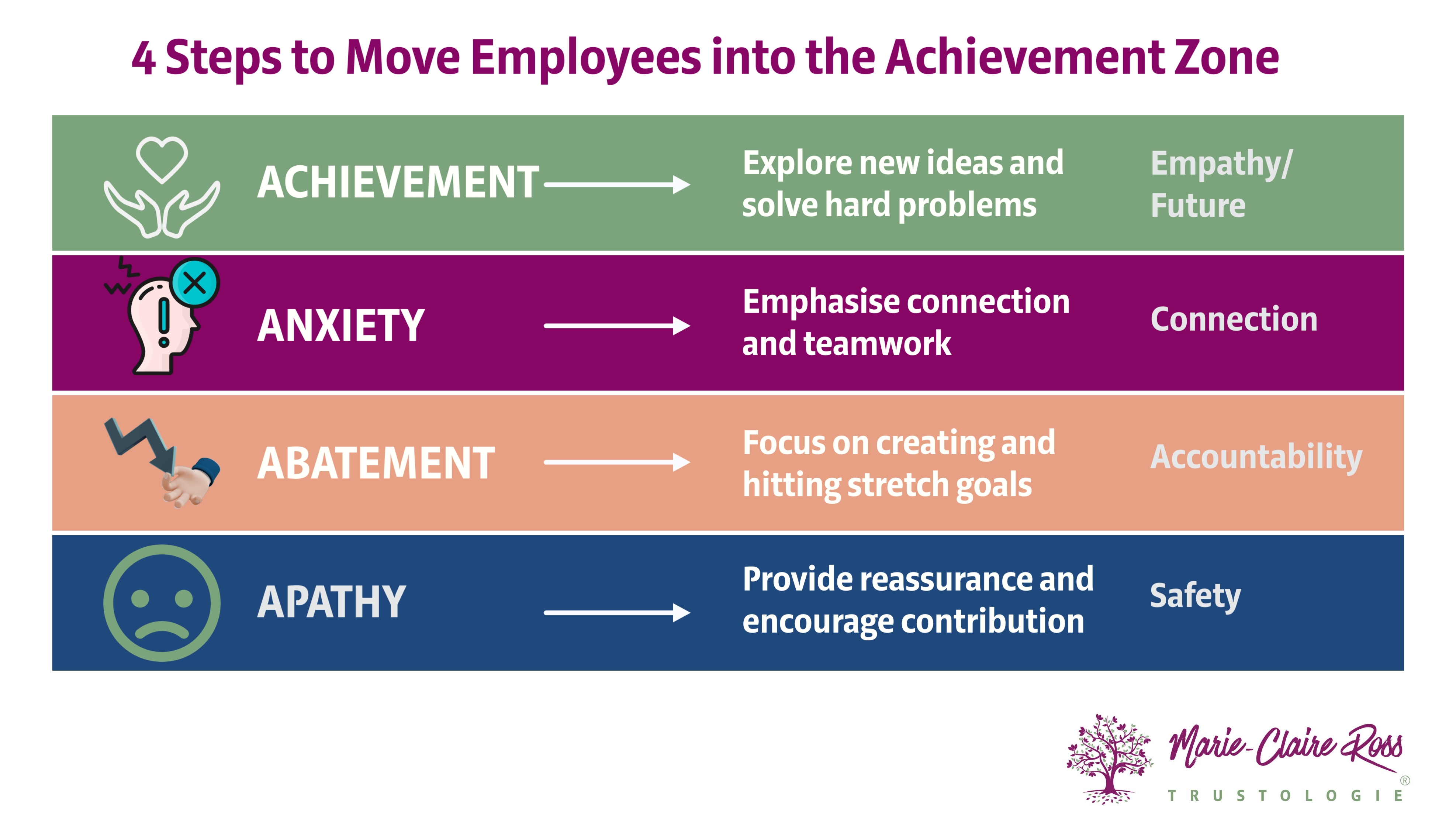11 min read
4 Practical Strategies for Better Emotional Management in the Workplace
I have a friend who often finds herself at the mercy of her emotions. Recently, she called me to rehash a confrontation she’d had with a group of...
Develop leaders, strengthen executive teams and gain deep insights with assessments designed to accelerate trust and performance.

Transform how your leaders think and perform with keynotes that spark connection, trust and high-performance cultures.

Explore practical tools, thought-leadership and resources to help you build trusted, high-performing teams.

Trustologie® is a leadership development consultancy founded by Marie-Claire Ross, specialising in helping executives and managers build high-trust, high-performing teams.

A few months back, I wrote an article called Are you Limiting your Company Vision?
Among the comments I received from people in social media about the article, there was one that stood out. It was from a CEO from a charity. His comment was “I’ve just come back from a holiday and created a big vision for our charity. I never have any trouble creating a big vision and I create one every few years. They come very naturally to me. We are going to change history and our members’* lives.” (*changed to protect their identity).
Now, you’re probably thinking – so what? He’s a CEO with a big vision. Good on him. And I’d agree with that. But when I read it, my first reaction was that it seemed a little pretentious and cocky. And maybe, just maybe, a bit defensive.
What I didn’t know at the time was his charity was being investigated for fraud. Chiefly, his demand for a very big salary and giving, well, not so much to his members (he even sells their details on a rented database). His members aren’t companies, but humans who are physically challenged. His big vision for the company was also quite a source of debate in newspapers. I also discovered he was quite keen to boast to journalists about his vision and his need for a big salary (which is probably why he commented on my article). Of course, no one was able to challenge him on his vision, without raising his ire.
His response really does bring up some important issues around CEOs and leadership. In particular, how they create and rally others around their vision. Let’s break it down into three areas:
It’s a myth to believe that the CEO creates their own vision alone. While it’s true that CEOs can create a wonderful solo vision on a retreat, the truth is that they need to get some type of feedback from others as to its suitability. Any board that accepts a CEO’s vision without challenging it isn’t doing their job. Leadership is about listening and being open to what is being said and what isn’t being said. It builds trust, strengthens relationships and makes it easier for others to buy into it.
Any CEO that doesn’t listen to advice, or who cuts down those who offer it, threatens the long-term viability of an organisation. No one person ever has all the skills, knowledge and talent to lead an organisation into the future.
A purported 3% of CEOs are psychopaths (the general population is 1%). They love powerful positions, lack empathy and have a considerable IQ. They also can have an astonishing trait of being quite delusional about reality and concocting a grandiose vision is their thing. They also tend to not care about employees (think Chainsaw Al, who in the 1980s ‘fixed’ failing companies by firing just about everyone) nor their customers. But they’re pretty good at pretending to care. After all, Enron executives have been called corporate psychopaths and they pretended to be wonderful corporate citizens by donating a lot of money to charity.
Any CEO who boasts about creating their vision on their own, manipulating information to prove they deserve a higher than average salary, while selling off the personal details of those in need, smacks of someone who sees people as mere tools in their quest for power. Of course, craving the attention of media and making outrageous statements are fairly typical for a psychopath.
Think Clive Palmer the Australian politician and Queensland Nickel CEO (and his boast about his vision of building the next Titanic and who appears not to care about the 200 employees he has fired) or Martin Shkreli, the ex-CEO of Turing Pharmaceuticals, who bought companies with much needed life-saving drugs and then jacked up the prices by as much as 5000% (he’s now been charged with fraud unrelated to his CEO job). His vision – kept changing from “doing more research into life-saving drugs” to the brutally honest “making money for shareholders.”
Then, there are narcissistic CEOs. They’re similar to the psychopath in that they are both arrogant, self-absorbed, insensitive and delusional about their abilities. The main exception is that the psychopath is more scheming and more likely to hurt others deliberately. The narcissist is too wrapped up in themselves to be bothered to actually hurt others. Donald Trump is a classic example.
Regardless of whether a CEO is a psychopath or not, or even narcissistic, when a vision is created to satisfy the ego of one person, it is always doomed to fail.
Great leaders of our time have always been humble about their achievements and quick to praise their team for getting results. When a leader boasts about their abilities, it really does reduce how much their employees trust them to do the right thing. Without trust, a leader will always struggle to get their employees to follow them. After all, we all know that when someone is out for themselves and not their team, that their motives are flakey.
One of the issues with a lot of organisations is that they create visions that are pretty ho-hum and mediocre. There is a real need to create visions that are revolutionary and a step up from the past. But they need to be anchored in reality and not the creation of a deluded egotist.
Board members, executives and employees need to get better at distinguishing whether the CEO is creating a vision that’s created to stroke their own ego or designed to ensure the organisation lasts more than a lifetime. Warning signs include getting angry at having their vision challenged, refusing to listen to feedback or a fantastical belief they have magical vision creation powers.
When times are good, it’s easy to believe that the CEO is creating the right vision. Even CEOs with medium level emotional intelligence can get carried away in a fast paced and successful environment and make incorrect assumptions about their company’s invincibility.
Of course, corporate psychopaths and narcissists are lauded for the ability to show no fear, be charismatic and aggressive. Unfortunately, some boards prefer those types of CEOs believing that they have the staying power to achieve difficult goals. Many boards are also fooled into believing their egotistical CEO as they can be highly persuasive. But study after study demonstrate that a narcissistic CEO is more likely to kill the company.
Without the right checks and balances, an inauthentic vision can quickly become overly ambitious and set the company up to fail over time. Being focused on what customers require by having regular conversations with them and being aware of industry changes, as well as having regular strategy discussions on progress are more stable mechanisms to create a vision that’s future proof.

11 min read
I have a friend who often finds herself at the mercy of her emotions. Recently, she called me to rehash a confrontation she’d had with a group of...

9 min read
True leadership presence isn’t a performance or a set of charisma hacks; it is the felt experience of who you are being in the room. By cultivating...

13 min read
As teams return from their summer (or winter) break, you may notice subtle shifts in your team’s energy. Even if the end of year was positive, a new...
With the rate of change and uncertainty in the world, CEOs think about trust regularly – no matter the size of their organisation.

Earlier this week, a devastating tornado struck Edwardsville, Illinois - killing 100 people. The death toll also included six people working in an...

Back in the 1970s - 1980s, Jimmy Savile was one of the most famous television presenters on the BBC. An effervescent, eccentric man he hosted "Top...